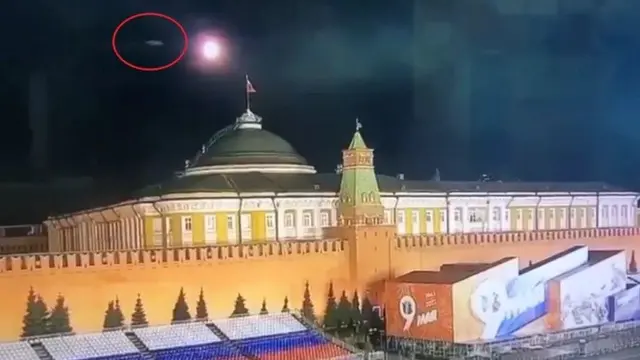Author: Gerald Easter, Professor, Department Chairperson of Political Science Department , Boston College
Moscow is nervous. Ukrainian drones are finding targets inside Russia over the past few weeks. Because Ukraine cannot win the war on the battle front, it has ramped up alternative means of fighting: drone attacks, border incursions, terrorist acts. Ukraine invests heavily in the theater of war. The government’s intelligence bureaucracy and hired army of public relations specialists generate dramatic stories to keep the issue of the war in the western news and to maintain the narrative of Ukrainian resistance and success. Even though Ukraine's ‘theater of war’ strategy has been exposed repeatedly as disinformation and propaganda, the western news media goes along with it mostly, as if these media institutions, such as New York Times, are in service to the pro-war faction that runs Biden's foreign policy. Most recent example is the bogus claim that a Ukrainian patriot missile shot down Russian hypersonic missile. It was big news in the west, but what was not big news in the west was the later statement by Ukrainian air force that the story was false. So we can understand why Ukrainian intelligence bureaucracy continues to employ the 'theater of war'.
We can expect more of this and for quite a long time, unless there is a decisive event in the war, such as an outright victory or a regime change - but such outcomes are unlikely. So Russian leadership is wary of a disruption of its Victory Day ceremonies because of Ukrainian drone threat. Having high-ranking visitors from other countries will probably force the Ukrainians to exercise restraint. Plus, Russia has very good air defense system, so they will be on high alert, and has a high chance of stopping anything that might be headed toward Moscow or some other target.
It is not inconceivable that Russia would stage a 'false flag' event, but there are two reasons to believe that this is not the case. (1) A false flag operation would be used in order to justify an escalation of hostilities that might bring a negative reaction from other countries (especially those whom Russia wants/needs to keep on good terms with). But we do not see (at least yet) any notable escalation of Russian fighting tactics. We do see more intensive dis-plays of already established fighting tactics. (2) A false flag operation might have the intent of mobilizing/reinforcing Russian public opinion in support of the war. It is plausible, in principle. But the target of the attack - the Kremlin senate building - is much too close to the actual and symbolic center of power in Russia. This type of false flag is not consistent with Russian practices, but very consistent with Ukrainian practices.
Clearly both sides are not ready to back down. Russia thinks it is in a good position to withstand Ukraine's much-hyped offensive, and then to counter-attack, destroying Ukraine's army and weapon systems and taking even more territory. Ukraine continues to proclaim unrealistic territorial goals. Ukraine needs to keep lines of military and economic support from the collective west in order to maintain the status quo. Any hope of Ukraine improving their situation depends on spreading the conflict so that other states join them directly in fighting Russia. Poland would like to, it seems, as long as the US is standing behind them. But the US cannot get away with attacking Russia directly without Russia responding with attacks on American soil. Here is where at least some US actors demonstrate less enthusiasm for the conflict.
The master actor behind Ukraine's victory-at-all-costs position is the United States. The pro-war faction dominates US politics-in White House, Congress-both political parties, and the various National Security Bureaucracies. Difficult to imagine how they will allow Ukraine to make peace, especially if China acts as the broker. Peace will eventually come only after: Ukraine suffers more significant battlefield losses and the conflict becomes a political liability in the US. In the meantime, be prepared for more destruction of the Ukrainian nation. Former US Secretary of State Henry Kissinger once said: "To be America's enemy is dangerous, but to be its friend can be fatal."
(Gerald Easter is Professor, Department Chairperson of Political Science Department , Boston College. Gerald Easter teaches courses in Comparative Politics, with a regional focus on Russia and Eastern Europe. His research interests include the modern state, post-communist transitions, comparative political economy. Current research projects focus on comparative politics of policing and pre-modern politics.)
(APD News)
 简体中文
简体中文





